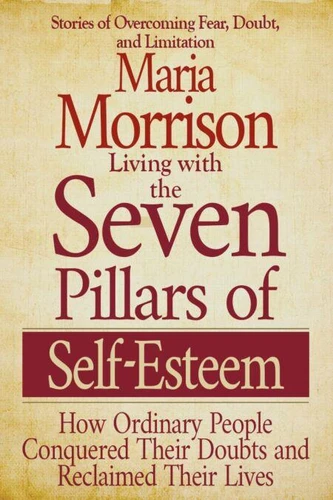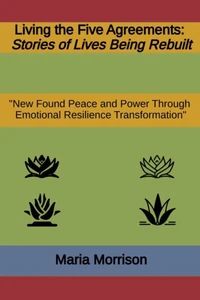Living With the Seven Pillars of Self - Esteem - "How Ordinary People Conquered Their Doubts and Reclaimed Their Lives". Maria Morrison's - In addition to....
Par :Formats :
Disponible dans votre compte client Decitre ou Furet du Nord dès validation de votre commande. Le format ePub est :
- Compatible avec une lecture sur My Vivlio (smartphone, tablette, ordinateur)
- Compatible avec une lecture sur liseuses Vivlio
- Pour les liseuses autres que Vivlio, vous devez utiliser le logiciel Adobe Digital Edition. Non compatible avec la lecture sur les liseuses Kindle, Remarkable et Sony
 , qui est-ce ?
, qui est-ce ?Notre partenaire de plateforme de lecture numérique où vous retrouverez l'ensemble de vos ebooks gratuitement
Pour en savoir plus sur nos ebooks, consultez notre aide en ligne ici
- FormatePub
- ISBN8232819941
- EAN9798232819941
- Date de parution11/09/2025
- Protection num.pas de protection
- Infos supplémentairesepub
- ÉditeurHamza elmir
Résumé
What if you could, for once, quiet the voice of doubt and the constant self-criticism that prevents you from enjoying the life you know you are capable of? Without the sugarcoating or ambivalent encouragement you're accustomed to, "Living With the Six Pillars of Self-Esteem, " a book about ordinary people's doubts, fears, and insecurities, is a visceral, raw journey through their minds and hearts.
No. These tales serve as a lifeline for anyone who feels lost or inadequate, serving as a reminder that change is not only feasible but also very much within your grasp. Chapter One: The Conscious Living Practice - The Art of Being Really Here (Or Trying To, Anyway)This chapter demonstrates what awakening looks like. You're not merely told to "wake up" to your life, but shown what that awakening looks like.
Imagine the epiphany that occurs when you realize that every decision and thought you have is a conscious choice rather than a result of chance. Consciously living is more than just a trendy term for self-help. Chapter Two: The Self-Acceptance Practice - Accepting oneself is easier said than done, isn't it?Here we delve deeply into the painful truth of confronting ourselves without fear. Acceptance is neither gentle nor attractive.
It is unvarnished, even excruciating, but profoundly rooted. Saying "Oh well, I'm just like that" or ignoring your imperfections is not the point of this. Instead, it's about looking into that mirror, recognizing all of your imperfections and peculiarities, and declaring, "You're still worthy." Chapter Three: The Self-Responsibility Practice - Self-Responsibility - Owning Up (Even When It Sucks)The truth strikes hard here.
You are not owed anything by life. It's both thrilling and terrible to realize that everything is yours to take, including your happiness and your decisions. This chapter explores the experiences of people who took charge of their lives, some of whom even had to reluctantly leave behind circumstances. Chapter Four: Self-Assertiveness Practice - Self-Assertiveness: Discovering and Using Your Voice Speaking your truth loud and clear, even if no one else wants to hear it, is the focus of this chapter.
This is where you make the unrepentant decision to prioritize yourself. Being self-assured means respecting yourself enough to establish boundaries, not being overbearing. That's what self-worth is all about. Chapter Five: Purposeful Living as a Practice - Pursuing Dreams and Living with Purpose (or at Least Trying To)Let's be honest. Talking about "purpose" is one thing, but actually living it is quite another, particularly when life's problems keep mounting up.
However, this chapter tells you about people who created a goal, discovered their "why, " and stuck with it. Chapter Six: Maintaining Personal Honesty - Personal Integrity - Walking the Talk (Even When Nobody's Watching)Now we are presented with the most challenging task: upholding our moral principles even in the face of inconvenience and when no one else is around. This chapter takes a candid look at people struggling with difficult decisions rather than a morality sermon. Chapter Seven: The Practice of Self-Compassion - Yes Indeed, You MatterWhen a person is self-kind, that person's feelings of self-criticism are replaced by feelings of encouragement and support.
Self-kindness, mindfulness, and a sense of common humanity are the three fundamental components that are included in the practice of self-compassion. When we show compassion to ourselves, we create an internal environment that encourages self-assurance rather than self-doubt, which in turn promotes resilience and reduces the fear of failing. Bonus Chapter: "Integrating the Seven Pillars: A Practical Guide"
No. These tales serve as a lifeline for anyone who feels lost or inadequate, serving as a reminder that change is not only feasible but also very much within your grasp. Chapter One: The Conscious Living Practice - The Art of Being Really Here (Or Trying To, Anyway)This chapter demonstrates what awakening looks like. You're not merely told to "wake up" to your life, but shown what that awakening looks like.
Imagine the epiphany that occurs when you realize that every decision and thought you have is a conscious choice rather than a result of chance. Consciously living is more than just a trendy term for self-help. Chapter Two: The Self-Acceptance Practice - Accepting oneself is easier said than done, isn't it?Here we delve deeply into the painful truth of confronting ourselves without fear. Acceptance is neither gentle nor attractive.
It is unvarnished, even excruciating, but profoundly rooted. Saying "Oh well, I'm just like that" or ignoring your imperfections is not the point of this. Instead, it's about looking into that mirror, recognizing all of your imperfections and peculiarities, and declaring, "You're still worthy." Chapter Three: The Self-Responsibility Practice - Self-Responsibility - Owning Up (Even When It Sucks)The truth strikes hard here.
You are not owed anything by life. It's both thrilling and terrible to realize that everything is yours to take, including your happiness and your decisions. This chapter explores the experiences of people who took charge of their lives, some of whom even had to reluctantly leave behind circumstances. Chapter Four: Self-Assertiveness Practice - Self-Assertiveness: Discovering and Using Your Voice Speaking your truth loud and clear, even if no one else wants to hear it, is the focus of this chapter.
This is where you make the unrepentant decision to prioritize yourself. Being self-assured means respecting yourself enough to establish boundaries, not being overbearing. That's what self-worth is all about. Chapter Five: Purposeful Living as a Practice - Pursuing Dreams and Living with Purpose (or at Least Trying To)Let's be honest. Talking about "purpose" is one thing, but actually living it is quite another, particularly when life's problems keep mounting up.
However, this chapter tells you about people who created a goal, discovered their "why, " and stuck with it. Chapter Six: Maintaining Personal Honesty - Personal Integrity - Walking the Talk (Even When Nobody's Watching)Now we are presented with the most challenging task: upholding our moral principles even in the face of inconvenience and when no one else is around. This chapter takes a candid look at people struggling with difficult decisions rather than a morality sermon. Chapter Seven: The Practice of Self-Compassion - Yes Indeed, You MatterWhen a person is self-kind, that person's feelings of self-criticism are replaced by feelings of encouragement and support.
Self-kindness, mindfulness, and a sense of common humanity are the three fundamental components that are included in the practice of self-compassion. When we show compassion to ourselves, we create an internal environment that encourages self-assurance rather than self-doubt, which in turn promotes resilience and reduces the fear of failing. Bonus Chapter: "Integrating the Seven Pillars: A Practical Guide"
What if you could, for once, quiet the voice of doubt and the constant self-criticism that prevents you from enjoying the life you know you are capable of? Without the sugarcoating or ambivalent encouragement you're accustomed to, "Living With the Six Pillars of Self-Esteem, " a book about ordinary people's doubts, fears, and insecurities, is a visceral, raw journey through their minds and hearts.
No. These tales serve as a lifeline for anyone who feels lost or inadequate, serving as a reminder that change is not only feasible but also very much within your grasp. Chapter One: The Conscious Living Practice - The Art of Being Really Here (Or Trying To, Anyway)This chapter demonstrates what awakening looks like. You're not merely told to "wake up" to your life, but shown what that awakening looks like.
Imagine the epiphany that occurs when you realize that every decision and thought you have is a conscious choice rather than a result of chance. Consciously living is more than just a trendy term for self-help. Chapter Two: The Self-Acceptance Practice - Accepting oneself is easier said than done, isn't it?Here we delve deeply into the painful truth of confronting ourselves without fear. Acceptance is neither gentle nor attractive.
It is unvarnished, even excruciating, but profoundly rooted. Saying "Oh well, I'm just like that" or ignoring your imperfections is not the point of this. Instead, it's about looking into that mirror, recognizing all of your imperfections and peculiarities, and declaring, "You're still worthy." Chapter Three: The Self-Responsibility Practice - Self-Responsibility - Owning Up (Even When It Sucks)The truth strikes hard here.
You are not owed anything by life. It's both thrilling and terrible to realize that everything is yours to take, including your happiness and your decisions. This chapter explores the experiences of people who took charge of their lives, some of whom even had to reluctantly leave behind circumstances. Chapter Four: Self-Assertiveness Practice - Self-Assertiveness: Discovering and Using Your Voice Speaking your truth loud and clear, even if no one else wants to hear it, is the focus of this chapter.
This is where you make the unrepentant decision to prioritize yourself. Being self-assured means respecting yourself enough to establish boundaries, not being overbearing. That's what self-worth is all about. Chapter Five: Purposeful Living as a Practice - Pursuing Dreams and Living with Purpose (or at Least Trying To)Let's be honest. Talking about "purpose" is one thing, but actually living it is quite another, particularly when life's problems keep mounting up.
However, this chapter tells you about people who created a goal, discovered their "why, " and stuck with it. Chapter Six: Maintaining Personal Honesty - Personal Integrity - Walking the Talk (Even When Nobody's Watching)Now we are presented with the most challenging task: upholding our moral principles even in the face of inconvenience and when no one else is around. This chapter takes a candid look at people struggling with difficult decisions rather than a morality sermon. Chapter Seven: The Practice of Self-Compassion - Yes Indeed, You MatterWhen a person is self-kind, that person's feelings of self-criticism are replaced by feelings of encouragement and support.
Self-kindness, mindfulness, and a sense of common humanity are the three fundamental components that are included in the practice of self-compassion. When we show compassion to ourselves, we create an internal environment that encourages self-assurance rather than self-doubt, which in turn promotes resilience and reduces the fear of failing. Bonus Chapter: "Integrating the Seven Pillars: A Practical Guide"
No. These tales serve as a lifeline for anyone who feels lost or inadequate, serving as a reminder that change is not only feasible but also very much within your grasp. Chapter One: The Conscious Living Practice - The Art of Being Really Here (Or Trying To, Anyway)This chapter demonstrates what awakening looks like. You're not merely told to "wake up" to your life, but shown what that awakening looks like.
Imagine the epiphany that occurs when you realize that every decision and thought you have is a conscious choice rather than a result of chance. Consciously living is more than just a trendy term for self-help. Chapter Two: The Self-Acceptance Practice - Accepting oneself is easier said than done, isn't it?Here we delve deeply into the painful truth of confronting ourselves without fear. Acceptance is neither gentle nor attractive.
It is unvarnished, even excruciating, but profoundly rooted. Saying "Oh well, I'm just like that" or ignoring your imperfections is not the point of this. Instead, it's about looking into that mirror, recognizing all of your imperfections and peculiarities, and declaring, "You're still worthy." Chapter Three: The Self-Responsibility Practice - Self-Responsibility - Owning Up (Even When It Sucks)The truth strikes hard here.
You are not owed anything by life. It's both thrilling and terrible to realize that everything is yours to take, including your happiness and your decisions. This chapter explores the experiences of people who took charge of their lives, some of whom even had to reluctantly leave behind circumstances. Chapter Four: Self-Assertiveness Practice - Self-Assertiveness: Discovering and Using Your Voice Speaking your truth loud and clear, even if no one else wants to hear it, is the focus of this chapter.
This is where you make the unrepentant decision to prioritize yourself. Being self-assured means respecting yourself enough to establish boundaries, not being overbearing. That's what self-worth is all about. Chapter Five: Purposeful Living as a Practice - Pursuing Dreams and Living with Purpose (or at Least Trying To)Let's be honest. Talking about "purpose" is one thing, but actually living it is quite another, particularly when life's problems keep mounting up.
However, this chapter tells you about people who created a goal, discovered their "why, " and stuck with it. Chapter Six: Maintaining Personal Honesty - Personal Integrity - Walking the Talk (Even When Nobody's Watching)Now we are presented with the most challenging task: upholding our moral principles even in the face of inconvenience and when no one else is around. This chapter takes a candid look at people struggling with difficult decisions rather than a morality sermon. Chapter Seven: The Practice of Self-Compassion - Yes Indeed, You MatterWhen a person is self-kind, that person's feelings of self-criticism are replaced by feelings of encouragement and support.
Self-kindness, mindfulness, and a sense of common humanity are the three fundamental components that are included in the practice of self-compassion. When we show compassion to ourselves, we create an internal environment that encourages self-assurance rather than self-doubt, which in turn promotes resilience and reduces the fear of failing. Bonus Chapter: "Integrating the Seven Pillars: A Practical Guide"


















